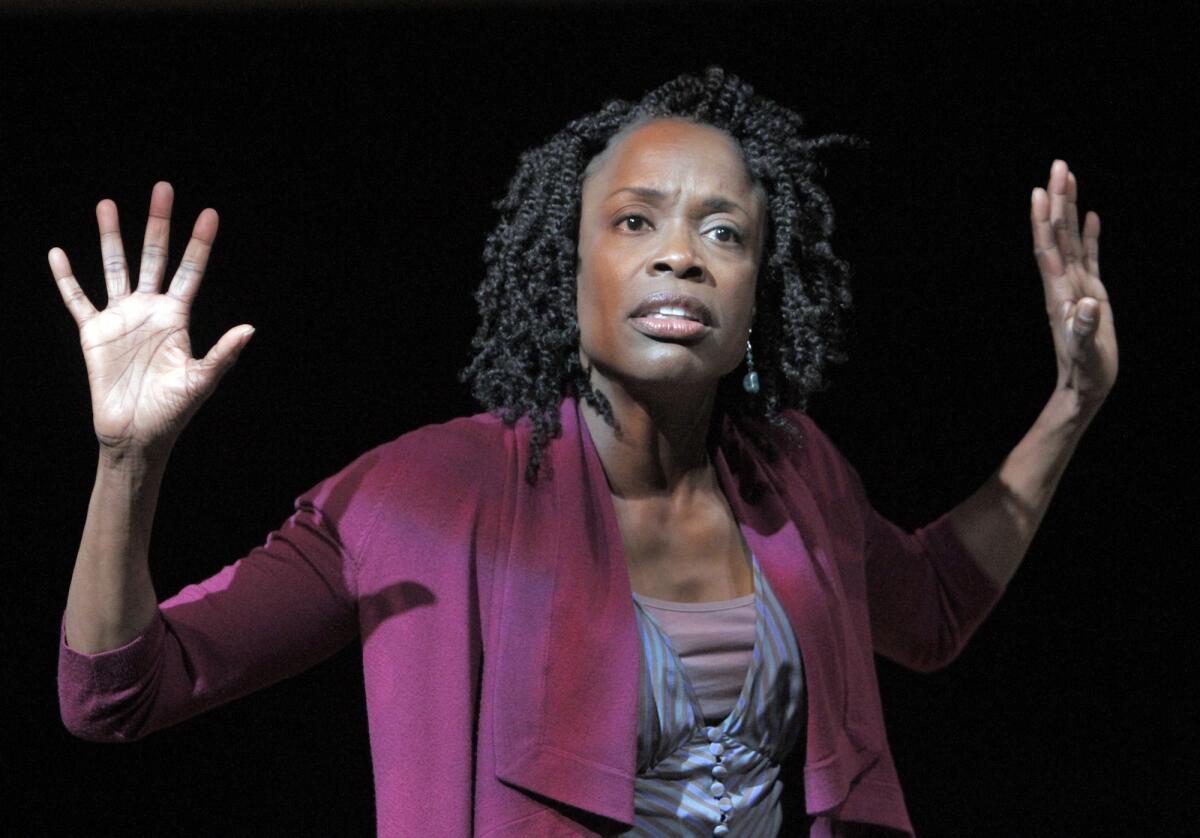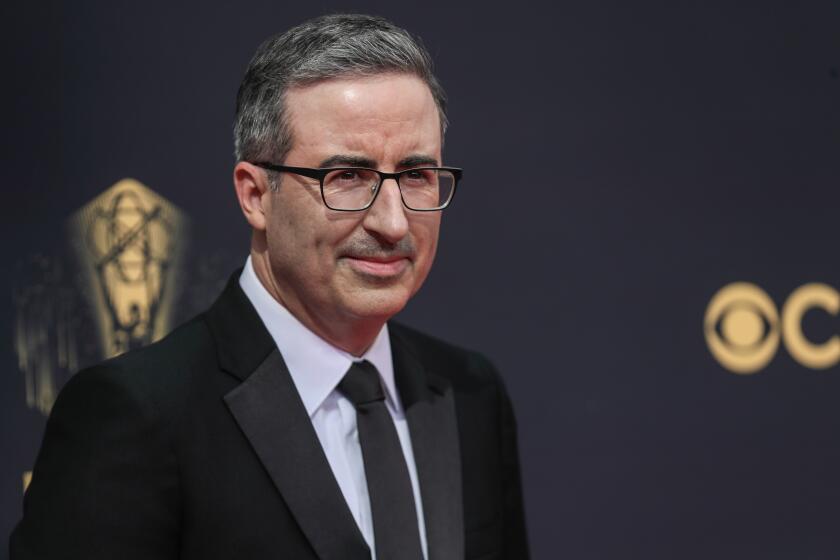Stage actors’ wage fight pits Tim Robbins against Charlayne Woodard

- Share via
A play in which Tim Robbins and Charlayne Woodard squared off as antagonists would likely draw a sizable audience.
Instead the two stars have squared off on opposite sides of an internecine struggle within Actors’ Equity, the national stage actors’ union.
At issue is whether union actors should be paid at least $9 an hour for their work in Los Angeles theaters of 99 seats or less, or be allowed to continue drawing much less than that, as they have in L.A. for decades.
Starting March 25, more than 6,000 Equity members in Los Angeles County will be able to vote on the $9 an hour proposal advanced last month by the national union leadership.
But the final say lies with the union’s 81-member national governing council, which is expected to deliberate on April 21, taking into account, but not bound by, the results of the “advisory” vote in L.A.
Actors get a token stipend of $7 to $15 for each performance in small theaters, depending on the ticket price and number of seats. Rehearsal time is unpaid. At the current rate they can earn up to $240 for a run of 16 performances.
At $9 an hour, with 60 hours of paid rehearsals tacked on, a producer could expect to pay $972 per cast member, a quadrupling of costs. Many small theaters earn less than half their money at the box office, relying heavily on donors to subsidize annual budgets that can range from less than $100,000 to, in rare cases, about $1 million.
Robbins, the founder and artistic director of the Actors’ Gang in Culver City, one of L.A.’s longest-running small theaters, stepped forward at a meeting of the theater community convened last month by 99-seat theater producers and urged a “no” vote.
He said the Actors’ Gang wouldn’t have survived if company members hadn’t been willing and able to treat rehearsals and performances as a labor of love rather than as a job for pay.
Now Woodard has come out on the other side. After moving to Los Angeles in 1989, she developed “Pretty Fire,” the first of her celebrated autobiographical one-woman shows, in two of the city’s 99-seat theaters.
“Actors’ Equity members are professionals and it’s time we started being treated as such. We are not hobbyists,” Woodard said in a written statement circulated this week by union leaders. “Producers in L.A. have been creating theater on the backs of actors working for $11 per show for decades. It’s time for a change. Vote ‘yes’ for change.”
Critics of the $9 per hour minimum say it would put untenable pressure on theater box offices, forcing some companies to fold and leaving the survivors too hard-pressed to do shows with big casts or challenging, unorthodox themes and styles.
The Los Angeles Drama Critics Circle recently condemned the proposed changes, warning that the result would be a mainstreaming of the small theater scene that would rob it of the artistic adventurousness that has been one of its hallmarks.
Proponents of the wage hike say, in essence, that it’s time for L.A. small theaters to grow up and join the real world, where actors need to earn a living. Union leaders say there’s room for growth that could turn small companies into midsized ones that pay regular union wages and benefits – something that rarely has happened on the L.A. scene.
The dispute has taken on the shape of a political campaign, with the union leadership recently responding to new developments with press releases.
After the Drama Critics Circle panned the $9 proposal, saying that most of the plays it has honored over the years wouldn’t even have been produced had it been in effect, the union responded that “the rug will not be pulled out from underneath L.A. small theaters” if the plan goes through.
“We understand there is frustration, fear and deep concern among producers and other members of the theater community… we are committed to working with producers to help build infrastructure and increase funding for theaters,” union leaders promised.
Woodard’s salvo was released Wednesday, immediately after opponents of the $9 wage had put on a media event on a Hollywood streetcorner to draw attention to an “I Love 99” campaign and website that’s trying to bring out a big “no” vote in the upcoming advisory balloting. Noah Wyle and Jane Kaczmarek were among the actors joining Robbins at the event.
City Council member Mitch O’Farrell, who had acted on L.A.’s small theater scene in the 1980s, helped publicize the gathering and put in an appearance. He recently pushed through a motion in which the council approved a “Hollywood Theatre Row” marker at Santa Monica Boulevard and Wilcox Avenue, where the media event took place.
In an interview Thursday, O’Farrell said it’s up to union leaders and the L.A. rank and file to sort out the issue.
Asked what he’d say to constituents who might be miffed that actors can’t pull down a minimum wage for their work in small theaters, O’Farrell said, “they’re not workers looking for employment. These are actors who are volunteering to do a creative project in live theater. The whole spirit of the small theater movement was not for job creation. It is for actors to keep from getting rusty, perfect their craft. It was all voluntary.”
O’Farrell said that a healthy 99-seat theater scene does help drive jobs and wages at other businesses, such as restaurants, that benefit when playgoers come out for a show.
Actors’ Equity leaders’ response to the Wednesday gathering that included O’Farrell said it was “shocking that any elected official would support producers who are unwilling to pay their artists minimum wage…. Equity believes that economic development should not come on the backs of [actors], by asking them to work for free.”
Along with the pro-minimum wage testimonials from Woodard and four other union members, Actors’ Equity’s latest news release included a statement of solidarity from Service Employees International Union Local 721, which represents government workers in Los Angeles and other Southern California cities and counties.
“Actors are often the only unpaid labor in small theater productions,” the SEIU statement said. “These are professionals putting in the hard work that makes theater possible, and they should not be paid less than minimum wage.”
Follow @boehmm of the LA Times for arts news and features
More to Read
The biggest entertainment stories
Get our big stories about Hollywood, film, television, music, arts, culture and more right in your inbox as soon as they publish.
You may occasionally receive promotional content from the Los Angeles Times.











